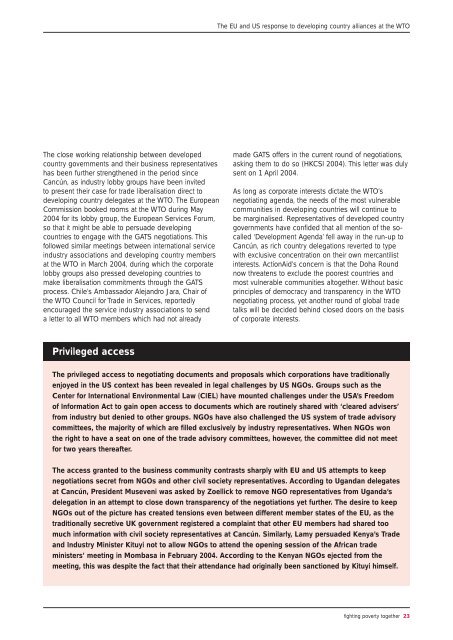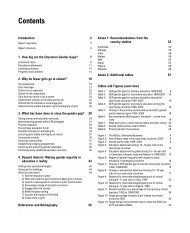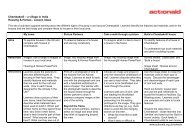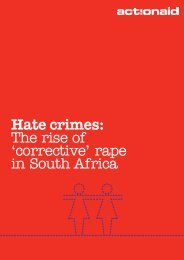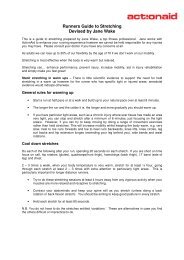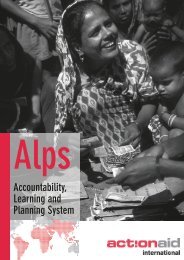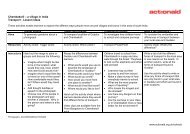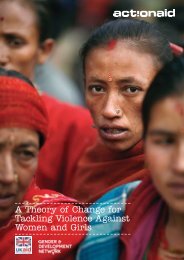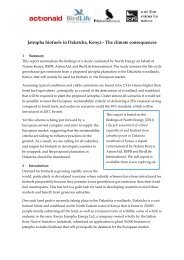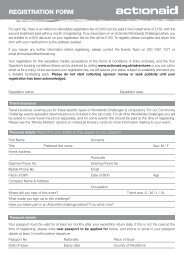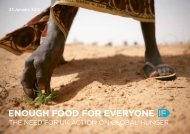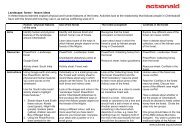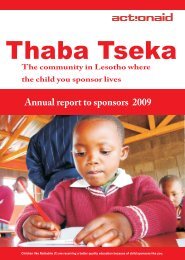Divide and Rule: - ActionAid
Divide and Rule: - ActionAid
Divide and Rule: - ActionAid
You also want an ePaper? Increase the reach of your titles
YUMPU automatically turns print PDFs into web optimized ePapers that Google loves.
The EU <strong>and</strong> US response to developing country alliances at the WTOThe close working relationship between developedcountry governments <strong>and</strong> their business representativeshas been further strengthened in the period sinceCancún, as industry lobby groups have been invitedto present their case for trade liberalisation direct todeveloping country delegates at the WTO. The EuropeanCommission booked rooms at the WTO during May2004 for its lobby group, the European Services Forum,so that it might be able to persuade developingcountries to engage with the GATS negotiations. Thisfollowed similar meetings between international serviceindustry associations <strong>and</strong> developing country membersat the WTO in March 2004, during which the corporatelobby groups also pressed developing countries tomake liberalisation commitments through the GATSprocess. Chile’s Ambassador Alej<strong>and</strong>ro Jara, Chair ofthe WTO Council for Trade in Services, reportedlyencouraged the service industry associations to senda letter to all WTO members which had not alreadymade GATS offers in the current round of negotiations,asking them to do so (HKCSI 2004). This letter was dulysent on 1 April 2004.As long as corporate interests dictate the WTO’snegotiating agenda, the needs of the most vulnerablecommunities in developing countries will continue tobe marginalised. Representatives of developed countrygovernments have confided that all mention of the socalled‘Development Agenda’ fell away in the run-up toCancún, as rich country delegations reverted to typewith exclusive concentration on their own mercantilistinterests. <strong>ActionAid</strong>’s concern is that the Doha Roundnow threatens to exclude the poorest countries <strong>and</strong>most vulnerable communities altogether. Without basicprinciples of democracy <strong>and</strong> transparency in the WTOnegotiating process, yet another round of global tradetalks will be decided behind closed doors on the basisof corporate interests.Privileged accessThe privileged access to negotiating documents <strong>and</strong> proposals which corporations have traditionallyenjoyed in the US context has been revealed in legal challenges by US NGOs. Groups such as theCenter for International Environmental Law (CIEL) have mounted challenges under the USA’s Freedomof Information Act to gain open access to documents which are routinely shared with ‘cleared advisers’from industry but denied to other groups. NGOs have also challenged the US system of trade advisorycommittees, the majority of which are filled exclusively by industry representatives. When NGOs wonthe right to have a seat on one of the trade advisory committees, however, the committee did not meetfor two years thereafter.The access granted to the business community contrasts sharply with EU <strong>and</strong> US attempts to keepnegotiations secret from NGOs <strong>and</strong> other civil society representatives. According to Ug<strong>and</strong>an delegatesat Cancún, President Museveni was asked by Zoellick to remove NGO representatives from Ug<strong>and</strong>a’sdelegation in an attempt to close down transparency of the negotiations yet further. The desire to keepNGOs out of the picture has created tensions even between different member states of the EU, as thetraditionally secretive UK government registered a complaint that other EU members had shared toomuch information with civil society representatives at Cancún. Similarly, Lamy persuaded Kenya’s Trade<strong>and</strong> Industry Minister Kituyi not to allow NGOs to attend the opening session of the African tradeministers’ meeting in Mombasa in February 2004. According to the Kenyan NGOs ejected from themeeting, this was despite the fact that their attendance had originally been sanctioned by Kituyi himself.fighting poverty together 23


